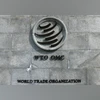India has told a WTO grouping with a major interest in farm trade that it will not discuss any new issue in the agriculture segment like imposition of export restrictions before a permanent solution is found with regard to public stockholding of food grains, an official said.
This position was cleared during a mini-ministerial virtual meeting of about 28 WTO (World Trade Organisation) member countries on agriculture issues on November 28.
In the meeting, Commerce and Industry Minister Piyush Goyal put forward New Delhi's approach to the issue saying that public procurement and stockholding of food grains serve the twin objectives of food security and income support to marginal farmers.
The 19-member Cairns group, which includes agri-exporting nations, lobbies for agricultural trade liberalisation. It was formed in 1986 in Cairns, Australia. Its members include Argentina, Australia, Brazil, Canada, Chile, Colombia, Costa Rica, Guatemala, Indonesia, Malaysia, New Zealand, Pakistan, Paraguay, and Peru.
Group members want the WTO to discuss comprehensive agriculture trade reforms such as not imposing export restrictions.
The group's representative was present in the virtual meeting.
More From This Section
"India has made it clear that no new issue in the agri sector can be discussed in the WTO before finding a permanent solution to a mandated issue of the public stockholding," the government official, who did not wish to be named, said.
India recently criticised Cairns member countries during a WTO meeting on public stockholding of foodgrain for food security purposes in Geneva, stating that members are monopolising time to discuss their submission on domestic support.
On the public stockholding issue, India is pushing the World Trade Organisation (WTO) members to find a permanent solution as the issue is important for the country which has to support its marginal farmers and feed the poor people.
Developed countries that are major agri exporters allege that foodgrain bought at MSP if offloaded in the global market can distort prices so there should be a cap on support measures. It is strongly opposed by India.
In India, the government procures rice at a Minimum Support Price (MSP) and provides it to the poor through a public distribution system.
About 80 developing members, including the African Group, G33 Group, and Africa, Caribbean, and Pacific Group, have been assertive, emphasising that this is a high-stakes issue because an outcome on public stockholding must be at the core of any potential agriculture package at MC13.
The 13th ministerial conference (MC13), the highest decision-making body of the WTO, is scheduled in Abu Dhabi in February next year.
To break the long-lasting stalemate in agriculture negotiations, the WHO chief has called for a mini-ministerial meeting on November 28.
)